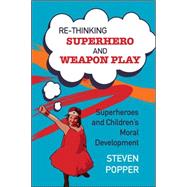- A detailed look at why many early years professionals and teachers are cautious about superhero and weapon play. Does weapon play make children more violent? Do ‘goodies versus baddies’ stories make children more confrontational? Do superheroes offer positive gender role-models? The book tackles these questions and suggests some alternative perspectives, as well as offering practical advice about keeping children’s superhero and weapon play positive and productive.
- An exploration of how superhero and weapon play relates to the development of children’s moral values, moral principles and moral reasoning; the building of children’s co-operation, empathy and sense of community; and the development of children’s sense of self and self-esteem.
- Discussion of the deep moral themes that lie within superhero narratives, and how superhero characters and narratives can be used to enhance and deepen children’s understanding of good character, moral responsibility, attachment, prejudice and ill-treatment, and why it is important to be good in the first place.
- A wealth of learning opportunities and suggestions of ways to use superheroes to advance children’s moral, philosophical and emotional thinking
“Warm, funny, smart, and honest, the argument made in Steven Popper’s book astutely, and with a sharp eye for detail, teases out many subtle reflections on morality, childhood development and the paradoxes of human nature, through the lens of our much-loved Superhero narratives. He is able, through nuanced and well-supported argument, drawn from both theory and practice, and from pedagogy and real life, to present a compelling and detailed account of the ways in which these stories might interface with the moral development of children. The book offers a rich, and articulate narrative of its own, which ‘aims at the good’ in its desire to propose that immersion in such superhero ‘narrative play’ can teach children about ethics, social responsibility, and what it is to be ‘human’. This is also a wonderful contribution to debates around the role of mass media in promoting critical thinking and enquiry among children.”
Dr. Sheena Calvert, Senior Lecturer, University of Westminster, UK
“This book authoritatively assesses the virtues of engaging in superhero play with young children. It argues that far from damaging children and encouraging them to adopt unthinking, aggressive behaviours superhero play is an implicitly moral activity. It encourages children to explore profound moral and ethical thinking. This book is both a well-researched account of the appeal that superhero play has for children of both sexes and a practical guide to how such play can be used imaginatively in early years settings.”
Rob Abbott, Senior Lecturer in Early Childhood and Education, University of Chichester, UK









